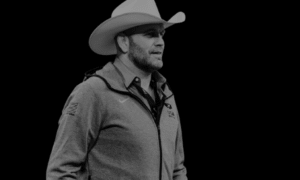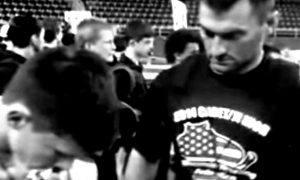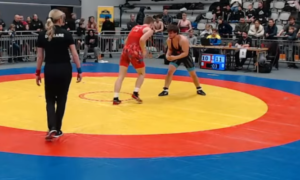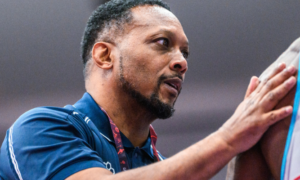The exercise was called “The Big Idea”. Van Stokes had instructed each group to work together on a plan that, if money were not an object, they would like to see enacted by USA Wrestling on behalf of the National Greco-Roman program. Money is a constant talking point, as you might imagine. One way or another, the conversation always shifts towards funding, or the lack thereof, and it seemed as though the assignment was supposed to be enjoyable. Fun, even.
I mainly just sat there in my own little world listening to Stokes speak. He was running the whole thing similarly to a corporate retreat and by this second day of the 2018 Greco-Roman Summit at the Olympic Training Center, I about had enough of the sporadic bickering and idiotic cross-banter that was dominating most of the discourse. But the first, and at this point only, Greco Summit was Gary Mayabb’s project. Mayabb had went above and beyond to get me out to Colorado Springs, and I respected him too much to dismiss the thought of attending. For whatever reason, he felt that I would bring value to this weekend-long series of meetings. In the end, I didn’t, unless said value were to be measured by the number of times Spenser Mango and I looked at one another bearing faces of exasperation. In fact, I did not utter a single audible word in front of the group during my two days inside of the “Gold Meeting Room”. Just didn’t feel like it was my place to say too much. Plus, the Haparanda Cup in Sweden was unfolding that same weekend. I would have preferred to just watch the stream, cover the tournament, write the recap. That’s my zone.
But there I was, jammed in a classroom with a bunch of Senior coaches, a few age-group coaches, and the duo of Mayabb and Stokes. Seated in the back of the room were USA Wrestling Executive Director Rich Bender, Chief Operating Officer Les Gutches, and National Team Services Manager (and whatever else) Jamie McNab. Cody Bickley was around, as well, and he actually ran a segment on Trials procedures.
Let’s be fair for a second: the USA Wrestling “brass”, as we’ll call them, did not have to be present. You’d suppose that for optic’s sake it was prudent for them to show face; but from Friday evening through the conclusion of Saturday’s meetings, they dutifully sat upright in their chairs the entire time. Which, I had presumed was difficult for them. Imagine absolutely loathing Greco but forcing yourself to sit through nearly a dozen hours of conversation about it? Yikes-city, ace. Rough stuff.
The Microcosm
FOB
So we split off into our groups to work on “The Big Idea”. Men with paper, pens, markers, all of it. My group consisted of former Northern Michigan University head coach Rob Hermann, Lucas Steldt, Luke Morris, and former top athlete/Army guy Glenn Nieradka. Hermann was the star of the weekend. He was the best speaker, by a mile, and virtually every item he proposed or presented was well-received. Not to go too far into it, but he was my favorite part of the weekend. Nearly everyone in the joint knew that Hermann was on his last legs at Northern, and he knew that we knew. But that didn’t matter to him. He legitimately still cared about the program and it was evident in his speaking style. The guy’s confidence in that environment was probably no huge deal to him but I found it remarkable.
On the flipside was Nieradka. In my view at that time, he was the most interesting participant. I only knew of Nieradka from his wrestling career. We didn’t know each other personally. At all. Still don’t. But the year prior, he had gone on the US program’s winter tour overseas and several non-Army athletes came back raving about him. How he was the most accessible and helpful during the stay in Europe, how he would instantaneously go fetch stuff for guys between rounds, how he communicated in the corner… A few wrestlers had even told me that they thought Nieradka would make for a great National coach someday. They were saying this in ’17. Well, he and I were sitting elbow-to-elbow in the Aquatic Center some 18 months later and this dude, while super-polite, was assassin-level quiet. I had at least laughed at the occasional corny jokes being shared. That way, everyone else in the room might think I’m normal. Nieradka, he really didn’t. He was silent.
The five of us converged on one of the desks to decide what our “big idea” might entail. Nieradka seized control. Without taking a breath, he calmly grabbed a marker and at the top of the page wrote “FOB”, the military acronym for “forward operating base”. And underneath “FOB”, the attributes he began to list wow’ed us.
— Rent/buy a house in a Greco-friendly country (Hungary, Sweden, etc.).
— Rotate athletes in and out of the house throughout the year.
— Plane tickets to neighboring countries from the FOB for additional training/competition are affordable.
There were a couple of more underscoring details but the first three acted as the hook. This wasn’t a “big idea”, it was easily the most logical and productive idea anyone from our group had heard in recent memory. And we let Nieradka know it — and he customarily deflected our compliments. He probably had the whole picture in his head for a while. We did not need the remaining time of the exercise. The only thing we did was format it for the whiteboard that was set in front of the room. Obviously, Hermann was selected to present the FOB. He had devoted his professional life to the US Navy, wrestling, and coaching. In doing so, he probably missed out on what would have been an enormously successful career in sales.
And he killed it. Hermann expertly talked to the FOB as if he had conceived its premise, fielded a few questions, and all of the other coaches in all of the other groups agreed that this was an actionable, achievable proposition. You have to remember: the objective of the task was to envision a plan for the Greco program as if funding were limitless. Groups could have drummed up something like “fly all of the World Cup teams to Springs for a six-month camp”, or “bribe the Cuban government into giving us all of their Juniors”, or “buy a luxury 747 just for the Greco program to use”. Instead, Nieradka had laid out a plan that would in the long run not only save money, it would also guarantee that more athletes would have opportunities to hone their skills overseas for a lengthy period of time, something that continues to be sorely-needed.
The FOB was as “can’t-miss” as it gets.
“And Guess What?”
The rest of Saturday droned on and on after “The Big Idea” presentations had wrapped, although there were a few entertaining aspects during the remainder. A constant stream of hypotheticals in particular had my brain spinning. Procedural red-tape tends to invoke that type of response. I paid close attention nevertheless, which wasn’t easy by mid-afternoon. I was growing impatient and wanted to get back to the dorm to piece together the Haparanda recap. The US had a few medalists, Joe Rau had been hosed badly in the final against Finland, and guys from the tournament were sending me dialogue for quotes.
At last, we ebbed towards dismissal. But before we could depart, Gutches lumbered from the back of the room to the front in an effort to address us. He started off with some word salad regarding how he knew that most of us thought USAW hated Greco, but that no, they actually didn’t. He mentioned the number of medals Russia won at the ’18 Worlds in all three styles combined, the number of medals Team USA earned, and how he didn’t like that because, you know, they’re Russians and the US needs to beat them, which is why they were investing hard into Greco.
He’s a good speaker in his own right. I had met him before that. Nothing major. He was very kind, put over 5PM, so on. Wasn’t a long conversation. Later I heard that he had popped off once or twice negatively about our platform but I didn’t take it personally. I expected it, and didn’t care then, nor do I now. But he’s engaging. I also respected his career, the way he wrestled. I’m old enough to have watched him. I didn’t see him as the Greco program’s chief adversary. Others close to me did and still do.
All of this was in my head as he spoke. I was listening, too, because I’m capable of thinking and listening at the same time. And the next blurb out of his mouth positively stunned me, and I wasn’t alone. Gutches had finished congratulating the room for…whatever. I don’t know, being there and having a basic grasp of functional interpersonal dynamics or something. Then he said, “And that FOB idea? That’s a great idea, and guess what? We’re going to fund it.”
WAIT, WHAT?
Floored.
I nervously looked around to check out the faces. I wanted to see if others in the room were as shocked into a stupor as I was. Gutches had just said, in very crisp English, that “The Big Idea”, Nieradka’s idea, would receive the funding necessary to pull off and so I wanted to be sure that no one was having a heart attack. Even if someone were experiencing a myocardial infarction following Gutches’ declaration, they would be fine. There have to be defibrillators all over the place in this building, I thought. But oddly, the reaction was rather muted.
For me it was a surge of adrenaline that I did not anticipate. Mayabb had done it. Matt Lindland had done it. USA Wrestling had done it. Gutches had done it. Together, they had managed to make the Greco Summit responsible for providing the program with a potentially game-changing training protocol, and all it required was Nieradka being invited, a few silly worksheets, and approximately 12 total hours spent in a classroom over the course of two days.
SOP
Naivete is a bummer because you are never quite sure if or when you are guilty of it. This is why sometimes people start sentences with “Maybe I’m naive, but…” They are just covering their tracks. I don’t worry about that so much. I get carried away. Regularly. It comes from not wanting to be a pessimist. The slightest hint of a positive development, or really just the sheer imagination of one, is all it takes for me to go overboard on optimism. A real character flaw it is. That’s okay. There are others I have that are decidedly worse.
By early-January, a little over a month after the Summit, this thing appeared to have legs. They were having actual internal discussions in Springs regarding the steps to make the FOB a reality. I was in contact with Lindland on a near-daily basis as it were, either via phone, text, or email. Naturally, I asked him about it often. At first, he was…optimistic.
Most of our conversations within the first two weeks of 2019 included various musings and verbalized daydreams. Hungary was going to be the landing spot. That much had been solidified. So, we would talk scenarios. #1’s and National Team members should get first dibs; guys can visit Croatia or Bulgaria and double back to Hungary in time for one of their important camps; how great it is going to be for younger guys at NMU to have a chance to get consistent looks against top Europeans… All of it was like this. Lindland’s priority was the Seniors and he felt it critical to ensure that those knocking on the door of World Team status would not be left out in the cold. But he equally loved picturing younger athletes hopping over to Hungary for weeks at a time. That along with the potential for US wrestlers to quick-hit other nations in Europe for camps and comps also had him excited. It brought out the kid in him.
But by the end of the month? Tone change.
Part of it was understandable. Initiatives take time, and they cannot see the light of day without proper checks and balances. There is legality attached to almost everything an organization such as USA Wrestling implements. You don’t just have a “light bulb moment” and instruct Bender or Gutches, or one of their lackeys, to get moving. Committees require involvement (by the way, the Greco-Roman Sport Committee needs to be torched into dust, but that is a whole other topic) when it comes to procedural matters, the other committees may have to sign off on extraneous facets of athlete participation, and the timing of a new endeavor in relation to the season (or fiscal year) plays a role, as well. There are layers. But the thickest layer is most often funding, which for American Greco-Roman wrestling these days is the real “f-word”.
The first hurdle was real estate. They weren’t going to just throw money at a house in Hungary without a modicum of investigation. That would have been a ridiculously impulsive and irresponsible thing to do. A key talking point became an apartment instead of a house. It made sense on the surface and was still a step in the right direction.
Except lodging soon faded from the conversation in favor of selection criteria. Again, this also wasn’t over-the-moon crazy. There had to be a mechanism in place for determining which athletes would receive opportunities to stay at the FOB; otherwise the program, and USAW themselves, would have to contend with all kinds of questions and complaints regarding why some guys got to go, why some guys didn’t, and defend against perceptions of athlete preference. Right? The fabrication of standards so as to avoid picking-and-choosing is what separates the US from other nations. It has to be this way.
Still, there was no escaping the feeling of lost momentum towards the end of January.
I took a special interest in the FOB because I understood what it could mean and imagining an impending launch occupied a lot of my Greco-related thoughts. It was 2019. That year’s World Championships kicked off qualifying for the Tokyo Olympics. How much better prepared for Tokyo qualifying and Tokyo 2020 might United States athletes become if they were able to spend, by orders of magnitude, more time training and competing overseas leading up to both objectives? How much better prepared for Senior competition would NMU students become if they, too, saw an enormous increase in chances to travel?
A few weeks prior, these were pleasant questions to ask Lindland, who was the only person I talked to about the FOB. The fun associated with that was dissipating. Those deemed brass started pumping the brakes ever so slightly. Adding procedural stipulations and exercising due diligence pertaining to a house or apartment? No problem. Probing logistical snags, re-checking with the Hungarians? Sure. But when they switched up and aimed to institute the FOB as a “pilot program” after the 2019 US Open, uneasiness set in. The dopey “pilot program” was to last just 16 days (not counting travel) and conclude with the Matteo Pellicone Memorial in Rome. National champs in the Olympic weight classes were to act as the subjects in this very brief experiment. You don’t need an apartment for that kind of trip. A hotel, motel, or even a hostel would obviously be sufficient (see image of original proposal draft below).

16? Who cares about 16 days? 16 days was not a “pilot program”, it was pretty much the same amount of time top US Seniors would normally spend overseas — on a single tour. USAW, in my own view, wasn’t taking it seriously. Lindland, he was boxed in a corner. He had by then become so accustomed to hearing “no” from these people with regards to potential plans that the faintest promise of a “yes” had him willing to jump through however many hoops necessary to keep the FOB alive. If they wanted to merely test it out in ’19 and fully deploy it the next season? Well, it was better than not at all. Such was how I read his state of mind.
It started to click. The reason why the majority of faces in the “Gold Meeting Room” were expressionless following Gutches’ monumental declaration? Because they knew to take it with a grain of salt.
And, they were correct.
USA Wrestling weren’t going to fund it.
They were not, after all, going to fund it.
Oh, they might have stretched out a helping hand, right after serving up a side dish of budgetary explanations. The fiscal year for USA Wrestling begins on September 1. Greco-Roman’s budget for that fiscal year, while not entirely subject to pre-allocated plans, was already more or less determined.
But who in that room on December 1, 2018 didn’t already know that? Was Gutches unaware that USAW’s fiscal year had begun two months prior? Let’s give him a head nod and assume that he, in fact, is decent enough at his job to know when the books open each year. Then why would he say that the organization to which he belongs, an organization for whom he makes critical decisions, would fund an endeavor if he knew that the money was not, or not yet, available to do so? Because spitting it back at donors, as indicated in the proposal draft screenshot below, is not what one might typically define as “funding it”.

But the FOB never even got that far. How could it, with an approach tantamount to repeatedly kicking a can down the road?
If it wasn’t one thing, it was another. The plan that called for the six 2019 US Open champs? On the scrap heap. It had instead been amended to include only those athletes whose United World Wrestling “Ranking Series” placement made competing in Pellicone (which that year was a ranking event) consequential. In the winter/spring of 2019, that amounted to three competitors: returning World silver Adam Coon (#2), G’Angelo Hancock (#3), and Kamal Bey (#7). Even before that alteration, the proposal, purportedly at the behest of USAW, sought to send — and pay for — extra staff to accompany the adult wrestlers. How else would Coon, Hancock, and Bey know to feed themselves? Tie their shoes, brush their teeth, call for transport?
 An official tethered to a delegation of three wrestlers or more is (basically) required overseas. But “support personnel” for housekeeping? For the“feeding of athletes”? These were described in the proposal language as “possible action steps”, meaning they were not necessarily locked-down. They were also hilarious to see in context on digital paper — and would have been a waste of money and passport stamp ink.
An official tethered to a delegation of three wrestlers or more is (basically) required overseas. But “support personnel” for housekeeping? For the“feeding of athletes”? These were described in the proposal language as “possible action steps”, meaning they were not necessarily locked-down. They were also hilarious to see in context on digital paper — and would have been a waste of money and passport stamp ink.
Next, the hang-ups were supposedly logistics, the crunching of crooked figures, cost-risk over-analysis… It became a blur. It became all talk. That the World Team Trials Challenge Tournament, scheduled for mid-May in Raleigh, coincided with the tentative dates of the “pilot program” meant it was as good as dead for 2019. Not that it mattered, of course. By early spring, the subject had grown sore. By the following autumn, no one really cared or remembered. The Olympic Year was in effect. Well, the first crack at the Olympic Year, anyway. Three years hence, the “Big Idea” that was the FOB is rarely discussed.
Epilogue
There indeed may exist other factors pertaining to why the FOB failed to become operational. It is probable that there are. Yet even if there are, or were, there is no reason good enough that exists to explain its demise. Or rather, its dormancy, since you never know. Maybe it’s not exactly dead. At the very least, the FOB and all of the accompanying material surrounding its genesis reside in emails opened long ago, in PDF drafts and unfinished sideways conversations. And this thing, this little narrative? It required calls with several coaches who are likewise privy to the matter and, unanimously, they remember the abrupt dissolution of the FOB quite the same way.
To a man, they also see it the same way: that there was once an idea, a great one, a “big” one. One that was not a catch-all problem-solver, but certainly one that offered hope. And then it was gone, like so many other great ideas for this program before it. When you look at the situation with an appropriate pause, that is the root of the issue. The seeming evaporation of the FOB was, by coaches and program leaders, expected. When you walk around the block enough times, you get to know the grooves on the sidewalk.
For all USA Wrestling ever wants to say about how much they have done and are willing to do for the National Greco-Roman program, they could have done this. They didn’t. They should have, and it feels as though they made excuses not to. You just hope that isn’t the case.
You just hope that there is enough hope left.

Listen to “5PM52: Two-Time Olympian Jim Gruenwald” on Spreaker.
Listen to “5PM51: Lining up with Tanner Farmer” on Spreaker.
SUBSCRIBE TO THE FIVE POINT MOVE PODCAST
iTunes | Stitcher | Spreaker | Google Play Music



















